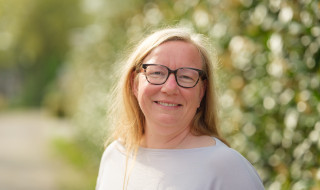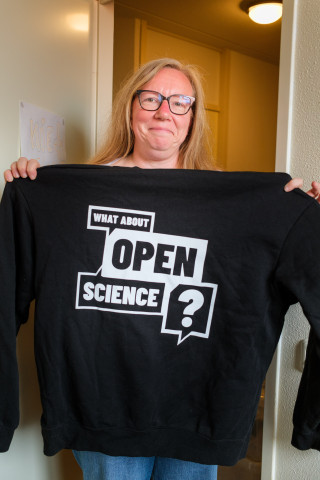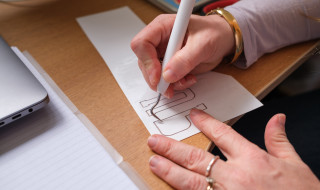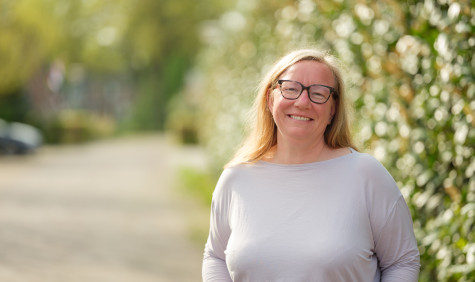Open science champion Sarah Coombs
Research support is a top-class sport
How do you embed Open Science in the world of higher professional education? Sarah Coombs uses a mix of expertise, networking, games and tenacity. "I would love to see the DCC-PO fully recognised as an expertise centre for research support. So we don't need to keep begging for money, but are valued as experts.”
Sometimes it’s just like top-class sport: Sarah Coombs not only became SURF Research Support Champion (in 2022), but has won no fewer than six prizes and awards as a research support officer in recent years. So we may speak of a true champion. Who is the person behind the Open Science adviser for Saxion University of Applied Sciences and the Association of Universities of Applied Sciences?

To begin with, Coombs chose the road to research support early on. After a bachelor's degree in Religious Studies in Canada, she wanted to go into academia, but the prospect of toiling on a dissertation for seven years did not attract her. "I then first worked for a year as a gym manager. I saw my clients sweat and realised there was a middle ground: helping researchers with their work. The movement for Open Access had just started."
Barely a year later, she had a master’s in Library Information Science, specialising in research support. And with that, she moved to the Netherlands.
Path cut off
That backfired, at least initially. "In theory, I could work in a university library anywhere in the world; in North America, the degree is even mandatory. But in the Netherlands, they only look at whether you have a PhD yourself. I never found out why that works that way."
Thus, the road to university libraries was cut off for her. But luck was on her side: one of the teachers at her integration course was married to the director of the Athenaeum library in Deventer. She was welcome to do a language internship there. Just as that ended, a vacancy came up. She decided to continue as a volunteer for a while and was then hired. "That's how I became an information specialist at Saxion, because the library was part of that college."
Good timing
It was the right moment. Universities of applied sciences had just become responsible for their own research. So there was a lot of work to do at Saxion for a specialised research support officer. "For example, one of the first questions I had to answer at the library was: do we have the right databases for scientific research? The answer was no, because that had never been the focus."
“When I talk to middle managers, I see their eyes glaze over. You see them thinking: what is this about?”
"Gradually, we made changes at Saxion that have turned research into a solid arm of the library. This was mainly because the team leaders gave me the freedom to participate in national and international projects. This allowed me to do the work I was trained for and where my passion lies."
Three jobs

What does Coombs fill her working days with these days? "For the DCC-PO (the national expertise centre for practice-based research), I work three days a week and for Saxion, basically two. For part of that, I am subcontracted to the Netherlands Association of Universities of Applied Sciences (Vereniging Hogescholen). In practice, everything gets mixed up. But that's good, because the different jobs also feed into each other. Everywhere it's about Open Science."
Her contact with researchers is mainly to help them with Open Science and Open Access. On balance, Coombs mainly supports the support staff, inside and outside Saxion.
The game What About Open Science is specifically designed to free middle managers from their ignorance.
Eyes glazing over
What is the most difficult thing in her work? She doesn't have to think about that for even one second. "The middle management in higher professional education! Those people have to make the decisions, such as whether someone can contribute to the DCC-PO. But half the time they have no idea what it's about."
"That in itself is understandable. We cannot expect them to know what is needed for a research infrastructure, or what the differences are between commercial parties or whatever. But getting them to ask someone else for an explanation is a tough challenge. And then the question is whether they understand that explanation."
Her frustration is palpable. "We have good contact with the administrators of the universities of applied sciences, for instance, through board committees. They are informed and have often already made policies. And on the work floor, the support staff also know about the issues. But when I talk to middle managers, I see their eyes glaze over. You see them thinking: what is this about?"
"Sometimes they seem to get it as the conversation progresses. But subsequently, the policy is still not implemented. Then what can I do? I'm just a consultant."
“If you look back, we've come a long way. But if you look ahead, there is still so much to do...”
Games
Yet Coombs doesn't give up. She is using her creative side to promote understanding of Open Science in a playful way. Together with colleagues in other countries, she has developed three educational games.
The first was OER Escape Room and revolved around open educational resources. "Together with a group of colleagues, you have 45 minutes to save your job. You do this by using open educational resources to develop a new module that attracts students. The game uses physical props. I made those myself, because naturally we had no budget."
The second game, Open Science in Peril, is a real game show. "It is partly based on Jeopardy, but we put our own spin on it." This game attracted so much attention that Coombs and her co-creators even won an award for it.
A sum of money was attached to that prize, allowing them to put extra effort into the third game: What About Open Science. That one is specifically designed to free middle managers from their ignorance: "They discover what the buzzwords are in Open Science, what you can make possible with money and what the decisions are about in the first place."

Sarah uses her creative side to promote understanding of open science in a playful way.
One wish
Time for the key question: what does Coombs think of the progress of Open Science? "If you look back, we've come a long way. But if you look ahead, there is still so much to do..."
At Saxion, the Open Access policy from 2012 has just been rewritten. For the first time, there is now a budget to let researchers publish articles that can be read by anyone free of charge. Equally important is the model Open Access policy recently developed for the Association of Universities of Applied Sciences. "I see that many universities of applied sciences now have an OA policy for the first time", Coombs says.
But she still has many wishes and ambitions. One of them she is keen to share here: "I would really like to see the DCC-PO fully recognised – by the whole of higher education and at all levels of management – as an expertise centre for research support. So we don't have to keep begging for money, but are collectively seen as experts, who are actually allowed to use their expertise."
Text: Aad van de Wijngaart
Photos: Jelmer de Haas
Sarah Coombs (1978)
2002 - 2004: master's degree in Library and Information Science
2018 - 2025: PhD at CWTS (Centre for Science and Technology Studies, Leiden University)
2006 - present: advisor Open Science at Saxion University of Applied Sciences
2021 - Present: advisor Open Science at the Association of Universities of Applied Sciences
2021 - present: member steering committee Open Science NL
2022: SURF Research Support Champion
2024 - present: content coordinator DCC-PO (Digital Competence Centre - Practice-based Research)
